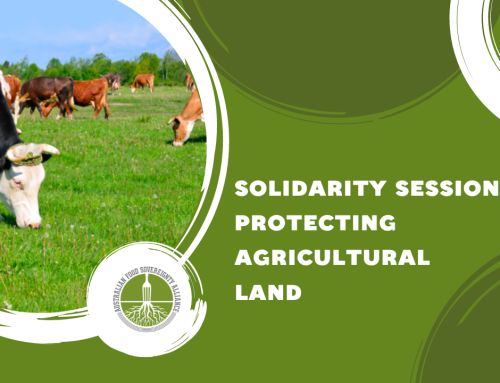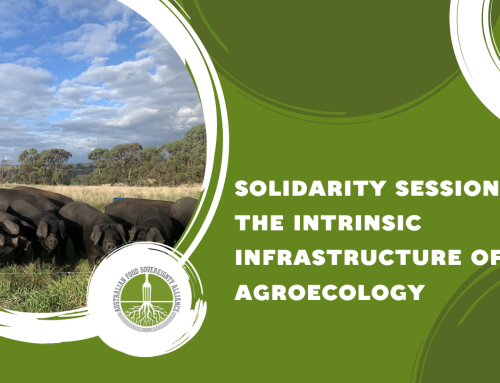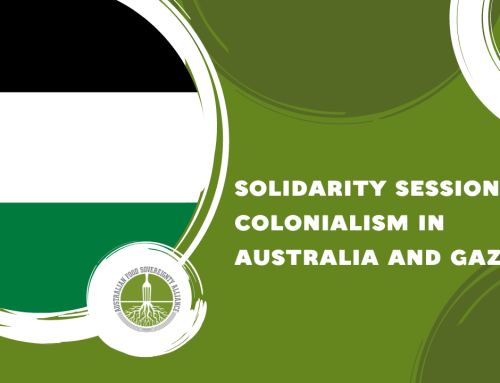In an Australian first, livestock farmers, butchers, chefs and supporters gathered to work out how to get people to eat less meat. Their focus was on shifting demand away from unsustainable industrially and intensively-produced meat with all its ecological and social costs, to meat from high welfare pastured production systems that nourish land, animals, and people.
Australia’s first Slow Meat Symposium, held in the central highlands of Victoria, came to an optimistic and encouraging close on Tuesday 5 September with the creation of a decisive action plan. The Symposium was a collaboration between Slow Food Central Highlands and the Australian Food Sovereignty Alliance (AFSA) and held in Daylesford on 3-5 September 2017.
An action plan was created through contributions from the more than 80 farmers, chefs, butchers, and supporters who attended from across Australia. It includes:
- the creation of a platform to enable the diversion of thousands of tonnes of food waste from landfill to farmers seeking alternative feed streams for livestock, and
- collaborations with others in the meat industry and animal welfare organisations to strengthen the movement to put slow meat ahead of industrial meat in butcher’s shops, menus, and households across Australia.
AFSA President and small-scale pastured pig and cattle farmer Tammi Jonas said, “Slow meat is not just better for our environment and the welfare of our animals, it offers a far more delicious future. Health and ethics are increasingly important to people and this is driving a shift away from industrially-produced meat. The Slow Meat Symposium saw some of our best producers, chefs, butchers, and allies gather to identify ways we can keep growing the slow meat movement so that more Australians can enjoy the benefits of eating better meat, and eating meat less often for the benefit of everyone and everything on the planet.”
Day One included a farm tour, butchery and cooking demos, and a slow feast at Jonai Farms & Meatsmiths before the group of 50 were bussed over to Milking Yard Farm. At Milking Yard, owners Bruce and Roz Burton grow heritage-based ‘Sommerlad’ chickens. Through a striking comparison with an industrially-produced and processed chicken found in a typical supermarket Bruce easily demonstrated the superior meat quality obtained.
Day One concluded at Belvedere Social in Daylesford, featuring a producer-driven menu built around ethical meats, and family farms. Guests dined firstly on a Spent Hen Soup, which consisted of a rolled pastured chicken medallion served in a spent hen consommé, prepared using a zero-waste approach.
On Day Two, an industry-focussed group of more than 80 butchers, chefs, producers and supporters of the Slow Meat philosophy from around Australia gathered in the Daylesford Town Hall to address the key issues around increasing production and consumption of slow meat, while decreasing consumption of meat overall. In his role as MC, Paul West, presenter of River Cottage Australia, guided the audience around the ethics and impact of the production, processing and cooking of meat, asking participants to consider what a ‘slow meat future’ might look like and how to practically implement it.
Stimulating plenary speakers included butcher Grant Hilliard from Sydney’s Feather & Bone and chef Matt Wilkinson of Pope Joan in Melbourne. Wilkinson raised the “crucial need to bridge the divide between chefs and consumers, and farmers and chefs.”
A range of delicious dishes were created for an educational slow meat lunch through the innovative pairing of local chefs and producers.
Concluding Day Two, Matthew Evans, host of SBS’s Gourmet Farmer and For the Love of Meat, presented his vision for a slow meat future, stressing the value of ecological resilience over consistency. Speaking to this he said, “We expect something that nature cannot give us. Every day the meat is seasonal. Yes, we have ethics and support, but inconsistency gives the possibility for greatness.”
Day Three was offered for the many farmers across Australia keen to see a revival of regional abattoirs in the face of steadily declining access to processing for small-scale, pastured livestock farms. Led by international guest Amanda Carter, owner of Cool Hand Meats, and operator of North Carolina leading small-scale poultry abattoir Foothills Pilot Plant the group of nearly 30 canvassed the viability of small-scale abattoirs, alternatives to large abattoirs (especially in response to sudden instability such as abattoir closure), better networks between producers and abattoirs, price stability, and access and transport to and from abattoirs.
Tammi Jonas, who is working with others in her region on the idea of establishing a long-term, all species abattoir in Daylesford (with the support of the Federal Government’s Farming Together program), visited the US in July this year on an abattoir tour visiting eight American small-scale abattoirs.
Jonas found that there are three key factors to prove a viable small-scale abattoir model: 1) red meats are more viable than poultry and so including them in an all-species facility increases the likelihood of success; and 2) slaughter is a break-even business at best and the inclusion of further processing facilities is critical to support both the business model and the needs of the small-scale farmers seeking holistic processing solutions. Further she found that “Australia is in a unique position to better the working conditions and diverse opportunities across the agricultural supply chain for workers.”
Contact: Tammi Jonas – President, Australian Food Sovereignty Alliance 0422 429 362
Gary Thomas – Leader, Slow Food Central Highlands 0448 483 616




